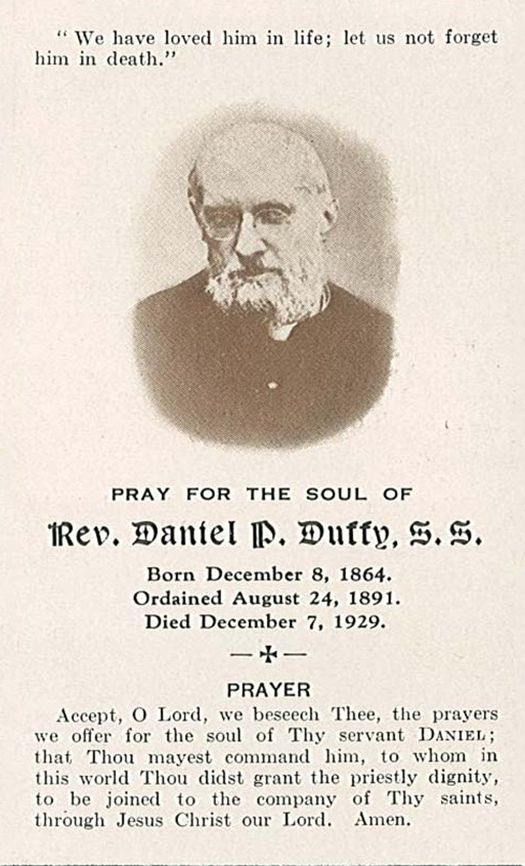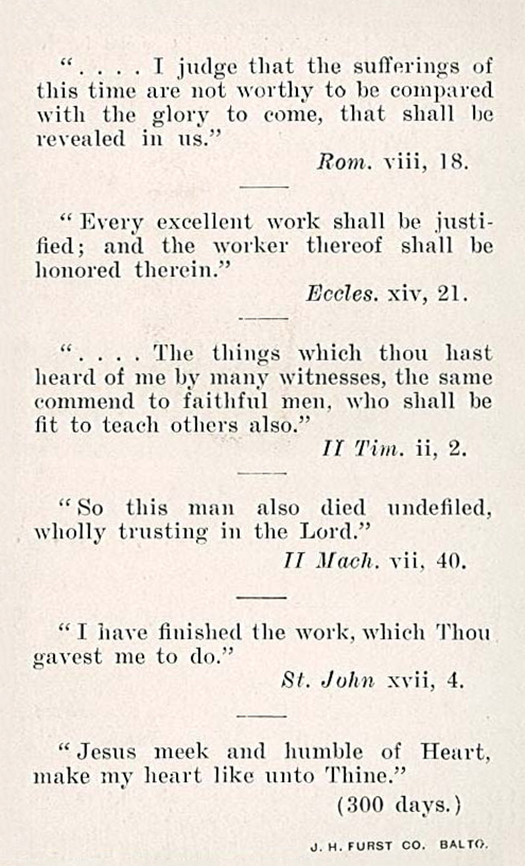Duffy, Father Daniel
1929, December 7
Date of Birth: 1864, December 8
Issy
April 25, 1930
Fathers and Dear Confreres:
Father Daniel Duffy died last December 7th in Baltimore. If we are to judge from the articles that his death evoked and from the praises extolling his memory, Father Duffy held a high rank in the life of our work in the United States. Helped by the articles sent to me, I hope to describe for you a very illuminating picture of this confrere who left such an abiding memory in the places where he worked.
Daniel Philip Claude Duffy was born at Baltimore, in St. Joseph’s parish, on December 8, 1864 on the Feast of the Immaculate Conception of the Blessed Virgin. While he was still in St. Joseph’s parish school, Our Lord spoke to his heart. Daniel Duffy made known his wish of becoming a priest. That was in 1879. On the advice of his pastor, Father Chapelle, (later Archbishop of New Orleans), he entered St. Charles, where he pursued secondary studies up to 1885. In September of that year Father Duffy became a student at St. Mary’s Seminary in Baltimore. There he received all his Philosophy training. In the two years spent there, Daniel Duffy was struck by the life of prayer, of study, of devotion, which our confreres led there. At the same time his already deep devotion towards the Blessed Virgin inclined him to St. Sulpice, where he knew that God’s Mother was faithfully honored. So, Philosophy finished, he asked the favor of being admitted to the Society.
The reaction to this request was favorable. To test beyond doubt his vocation and his abilities, he was asked to serve at St. Charles College for a year. Father Duffy agreed to do as he was asked. In the course of the school year 1887-1888, he was a teacher at the minor seminary which he had left two years before. Between time – no doubt while he was at St. Mary’s – he received tonsure. After that he came to France. On October 2, 1888, he was admitted to the Seminary of St. Sulpice in Paris and stayed there three years. There he was ordained priest on August 24, 1891, by Bishop Potron of Jericho.
From Paris, Father Duffy was sent for a year to the Procure [Rome] of St. Sulpice. There he took his licentiates in Theology and Canon Law, and returned to France to make his Solitude in the scholastic year of 1892-1893. His Sulpician formation over, Father Duffy put himself at the disposal of his superiors and showed himself ever ready to fill any post they might entrust to him.
They were many and varied. As Prefect of Discipline at St. Charles, he filled that role with an application and zeal hardly possible to surpass. Teachers and students – no one escaped his concern. That concern, it must be admitted, in spite of the justice and impartiality which characterized it, could seem in some ways excessive. But all agreed in recognizing in Father Duffy a supernatural sense of duty, simple and good charity, care of the details which go into the making of a man and which assure to a priest success in his dealings with boys and young men.
From St. Charles our confrere went to St. Mary’s Seminary in Baltimore. He was appointed there to teach Holy Scripture to the Philosophy students, and he stayed there two years, from 1897 to 1899. There, as at St. Charles, all – but especially his confreres – experienced the delicacy and the devotion which underlay his charity in the self-denial to which, it seems, he had dedicated himself.
Transferred to Boston in 1899, Father Duffy in that seminary, as at Baltimore, continued in the teaching of Holy Scripture. He joined to that the teaching of Liturgy. In Boston there became prominent in Father Duffy the practice of a virtue which induces us to place him alongside his then Superior, Father Hogan, certain of our confreres of yesteryear and today, and St. Francis of Assisi himself – the virtue of poverty. Generous to others of his own possessions, he deprived himself in every way: clothes, journeys, little things involving his well-being and comfort. He endeavored to keep at a minimum the expenses connected with those little things whenever it was a question of himself. And it can be written of him, while combining admiration with a little lightness, that Father Duffy “knew the value of a dollar.”
He knew it too well on the day when later on his superiors named him Treasurer of the Boston seminary. Over concerned about not squandering diocesan funds, Father Duffy mistakenly involved the seminarians and his confreres in his own austerity. The cost to him was high. Stomachs ached, the good spirit of the community was put to the test. It was necessary to relieve Father Duffy of functions for which he was not fit and to give him new duties in which he could use other qualities.
In 1901 he was made Superior of Philosophy in Baltimore, then in 1902 Superior of the University seminary of Washington. In these new positions Father Duffy knew how to act conscientiously in his jobs. However, too much goodness joined to a fussiness became a bit annoying. It prevented our confrere from succeeding as completely as might have been hoped. He was better fitted for functioning as a teacher and as a director. With no difficulty, he took up these functions again at St. Mary’s Seminary in 1906.
There for long years Father Duffy taught, acted as director, and exercised on all, by his example, the very deep – hardly noticed – influence, which was truly his grace.
As teacher of Moral Theology and Holy Scripture, he was noted for his clarity, his precision, his concern for organization and detail. As spiritual director he was careful to remain simple, direct, and practical with his penitents. With them, as for himself, he held up almost exclusively – after the Gospel – the Imitation of Christ and the Introduction to the Devout Life.
Otherwise, Father Duffy was not a great reader. Above all else, he was a man of reflection and meditation. And when he gave meditations, his considerations were always a great deal more practical and affective than speculative. In him the interior life seemed the principal object of his thoughts, the substance of his endeavors. It was the basis for his influence and accounted for his success. It doubtless explains his attitude, always very dignified and thoroughly priestly; his profound respect for holy things; his admirable abnegation in his sufferings; his holy indifference about the functions entrusted to him and then removed from him; his zeal for the spiritual good of others, when his expertise and unfailing devotion were appealed to; his deep humility which often sparkled with a glint of humor, but which never failed; his devotion toward the Blessed Virgin, whom he loved to call “My Mother, Our Mother,” and his attachment to the seminary which had formed him and where he had accomplished so much.
Father Duffy remained a teacher at St. Mary’s Seminary till near the end of his life. He lived, however, at St. Charles because the air there was fresher; and he worked there, too. After the building of the Roland Park seminary he would have been happy to come there for he hoped that that residence, like that of St. Charles, would be good for his health. His hopes, unhappily, were deceived.
Father Duffy had never been robust. His thirty-eight years of priestly life were thirty-eight years of hard work. Always, however, with care and foresight, he was able to fulfill his duties. Ever since 1911, the year of his automobile accident, Father Duffy visibly declined from year to year. Yet no one realized his end was near. Brought to St. Agnes Hospital in Baltimore, Father Duffy died there last December 7th, the eve of the Feast of the Immaculate Conception, one day before his sixty-sixth birthday.
Our confrere’s body was laid out at the new Roland Park seminary on December 8th, and a Requiem Mass was sung there the next day for the repose of his soul. On December 9th, in the evening, the body was brought back to the old St. Mary’s Seminary. There, on December 10th, the funeral was held. Religious and secular priests and Church dignitaries crowded into the venerable chapel to pay their last respects to the well-beloved priest whom God had called to Himself. Archbishop Curley of Baltimore consented to attend the funeral service and gave the absolution. Bishops McNamara, Auxiliary of Baltimore, and McAuliffe, Auxiliary of Hartford, were happy to join Archbishop Curley and demonstrate their regard for the deceased, and their faithful affection for St. Sulpice.
After the absolution, Monsignor Hugh J. Monaghan preached our confrere’s eulogy, praising particularly his patience and his devotion to the Blessed Virgin, and drawing lessons from his life and death.
Father Duffy’s body now rests in the little cemetery at St. Charles near the house which our confrere loved so much and where he spent his last years. Let us pray for the repose of his soul and let us keep alive the meaning of the example he left us.
Please accept, Fathers and dear confreres, the expression of my respectful and fraternal affection in Our Lord.
P. Boisard
Vice-superior of St. Sulpice


